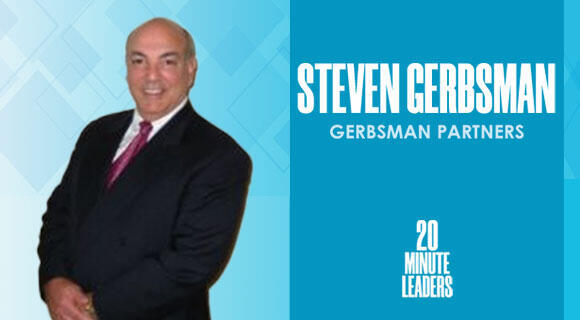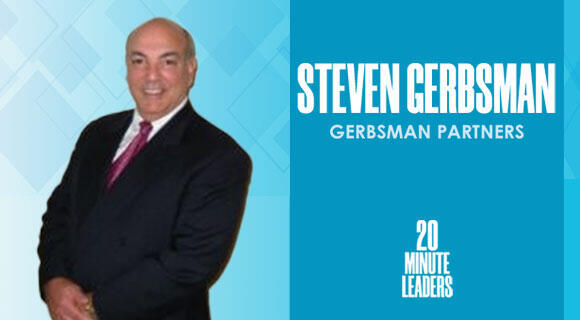
20-Minute Leaders
“The person that asks the questions is really the true leader.”
Asking questions and inviting feedback are important activities for good leaders, says Steven Gerbsman, managing principal at Gerbsman Partners.
Asking questions and inviting feedback are important activities for good leaders, says Steven Gerbsman, managing principal at Gerbsman Partners. The leaders who just give orders and expect everyone to agree are not going to succeed in the long run, he shares. Gerbsman says CEOs have to be willing to put their egos aside to allow criticism and consider shifting their strategy in tough times like we have now. He says that CEOs who have only seen good times are too optimistic when storms come. Gerbsman advises every entrepreneur to have a mentor who will give genuine feedback and inspire dialogue as well as hiring people who are willing to challenge them. He explains that listening is difficult for everyone, but mastering it is very important. He also encourages those who want to be entrepreneurs to get a job first and get hands-on business experience before launching their own ventures.
Steven, why do some companies succeed and some companies fail?
It is really simple: cash, cash, and cash. We've been in business 40 years, and I always like to say, "The more things change, the more they remain the same." You had a cycle in 1980. You had a cycle in 1989, '92, '98, 2001, 2008, 2014. It always revolves around where people are in cash. When companies raise 10 to $200 million, they are in different cycles, but they have a certain amount of runway, and after typically 18 months to two years, stuff happens. It could be market, competition, gross margin, management, strategy, or any or all the above. But they all revolve around the issue of cash.
There is something called a "black swan," which is always scary. We are in a black swan right now. We are in an atypical situation. We have oil, we got Iran, we got China, we got interest rates, we got what's going on in Europe, we got Ukraine. There are all these things that are happening that sort of create havoc. Why do things happen? It's market, it's competition, but it's also timing. This happens probably every four to six years. The real issue of why companies succeed and why companies fail really relies on the board of director's responsibility to hold senior management responsible and accountable. That's my biggest gripe over the years as a CEO, investment banker, investor, operator or crisis manager. Typically, you want to see companies have strategic plans. Here's the goal for the next three months, and then what happened.
One of the big issues is what I will call the lack of financial controls. One of the things that I totally recommend people to do from a cold-cock startup to no matter how your business is, is to do bottom-up, go-forward financial planning. You go through and you look at your people, you look at your expenses, you look at the realistic sales projections, you look at the cost of goods, et cetera. Typically, a lot of the projections are way too aggressive. You've got to hold people responsible, accountable, and you’ve got to do financial planning from the bottom-up. It's that simple. It's not magic. Basically, people have to live through it because it's hard. You have to learn it yourself. We are going through one of these cycles now that I think is going to get a lot worse before it gets a lot better.
What are some ways that you are thinking about this that would allow for a company to come out on top rather than fail in these situations?
The first thing is you’ve got to be realistic and move your ego aside. We are in totally atypical times as we have been in 2001 and 2008 as an example, which means it's hard to project what's going to happen on a go-forward basis. It's easy to manage against cost. Revenue is always the toughest. I would always err on the side of cautiousness and conservatism in the revenues, because it's always better to beat something than try to explain the miss.
But they all relate to cash. You have to have enough to weather the storm. One does not know when the storm ends, so be conservative. You manage on a monthly to quarterly basis. This is where the challenge comes through. I've been through four generations now of venture capital people and two or three of bankers, and the CEOs are getting younger, and if you haven't been through this, you are too optimistic. You’ve got to listen to some gray hair or no hair [people] say, "Be conservative. It's okay.”
It's easy because I'm an outside guy that comes in and sees this stuff, but I always look at the board and is the board holding people responsible and accountable. If you find the better companies and the better equity sponsors, they are spending more time with their portfolio companies and they are working with them to give them the guidance they need. These are perilous times, and we'll get through them. There is no question we get through it. The question is: How much do you have to bleed and how much do you have to prepare?
One of the next things that's going to come down is when you start slashing and burning. You always have to be concerned about the human nature of people. People need to survive. So you have responsibilities to your shareholders and to the people who work for you, but you also have responsibilities in a general economic environment.
How do young entrepreneurs like myself starting out ventures think through these concepts in a mature way and create an environment around us that allows us to nurture these situations and to succeed with them?
If I had answers to that question, I'd be really good. There are two issues that you deal with. You have to feel comfortable with people that are either mentoring you or giving you guidance. And as the CEO, you have to move your ego aside a little bit. Listening is very, very hard at all levels. You need a mentor and you need somebody to talk to that gives you comfort, not to say you are right, but to say, "Have you thought about these things?" Not to give you the answers. The second thing is, you've got to hire and train good people. People that will tell you what's wrong, what's right. I remember I ran a $250 million company in the 70s in the technology world. One of the things I learned is you hire strong people who can challenge you and stimulate you. But hiring strong and capable people is not necessarily easy.
The second thing is that in today's world, everybody wants to be an entrepreneur and raise money; my recommendation is go get a job. Make a sales call. Go down to the manufacturing plant. Close an order. Find out what it is to collect accounts payable. Make some sales projections. I think it's for most people. You've got to come from somewhere. I came from the IBM corporation. I'm proud of that. So that's something I strongly recommend to entrepreneurs.
Don't be afraid to make a decision. And if it's wrong, you admit it and you say, "Here's what I did and here's what I'm going to do to solve the problem," at whatever level. That's not easy. But you'll learn it because you have to.
Part of the process as you are also growing and maturing as a leader is to surround yourself with people that will hold you accountable to these traits and these qualities. Right?
How many meetings have you been in where the lead person sits and talks and pontificates, tells you how good it's going to be and what their thoughts are, and doesn't really ask questions? Going into a meeting where somebody would say, "Okay, I want to do this. But what do you think? How do we go about this?" The person that asks the questions is really the true leader.
Steven, I really appreciate your time again.
I'm going to leave you one last thought. Remember, if you are the CEO, you are responsible and accountable to take care of your people. Too many people say, "I'm going to take care of myself." You take care of your people, you will be taken care of. It's all about people.
Michael Matias, Forbes 30 Under 30, is a Venture Fellow at Innovation Endeavors as well as investment Venture Partner at Secret Chord and J-Ventures. He studies Artificial Intelligence and Human-Computer Interaction at Stanford University, and was an engineer at Hippo Insurance. Matias previously served as an officer in the 8200 unit. 20MinuteLeaders is a tech entrepreneurship interview series featuring one-on-one interviews with fascinating founders, innovators and thought leaders sharing their journeys and experiences.
Contributing editors: Michael Matias, Megan Ryan















